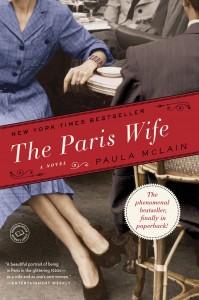The Paris Wife
Ernest Hemingway’s fiction speaks volumes about the author. There is no mistaking the Hemingway persona and bravado in the main characters (usually named Nick Adams) of every one of his novels. And countless biographies have been penned about Papa in an attempt to analyze the man, the myth, the machismo.
I’ve just finished “The Paris Wife”, an historical fiction by American author Paula McClain. The title refers to Hadley Richardson, Ernest’s first wife. The story is told from Hadley’s point of view, in her voice, which is a unique approach. Hadley Richardson, nine years older than Hemingway, meets the young writer in Chicago in 1920. Within a year, they were wed and departed for Paris and points beyond, including Switzerland, Spain and Italy.
McClain does a splendid job painting the landscape of the Lost Generation, including luminaries such as Zelda and F. Scott Fitzgerald, Gertrude Stein, Ezra Pound and even Alice B. Toklas. The authoress uses dialogue between these Jazz Age giants to display their personalities and the dynamics of the relationships between each.
I learned a lot in reading this novel, too. I did not know that Gertrude Stein had such an influence, was such a major mentor to Hemingway or that he wrote his memoir “A Moveable Feast” for Hadley. It was actually the last book he wrote. I did know that Hemingway had dedicated “The Sun Also Rises” to her. McClain’s descriptions of the bullfight culture and Hemingway’s fascination with it is quite vivid. McClain also wrote two chapters from Ernest’s point of view and I think this unique glitch helped served as a kind of counterbalance for the predominant female voice throughout the rest of the novel. Equally perplexing is Hemingway’s desire to be acknowledge while at the same time refusing any kind of literary help.
I think it is also healthy to be reminded that our heroes are human beings, too; that much of Hemingway’s bravado was based on his insecurities and that, as McClain has Hadley state toward the end of the novel, “He was such an enigma – fine and strong and weak and cruel. An incomparable friend and a son of a bitch. In the end, there wasn’t one thing about him that was truer than the rest. It was all true”.
It is interesting to note that both Ernest and Hadley’s fathers both took their own lives and that Hemingway eventually would, too. But this novel does not deal with the older Hemingway, just the young buck reporter and aspiring novelist trying to make a name for himself in the midst of the impetus of his legendary drinking.
I thoroughly enjoyed the “The Paris Wife”, which is Paula McClain’s second novel. She has also written a memoir titled “Like Family”, which I look forward to reading, along with her first novel, “Ticket to Ride”.


